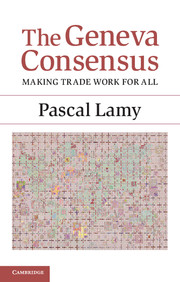Book contents
- Frontmatter
- Contents
- Preface
- 1 Harnessing globalization amid the crisis facing multilateralism
- 2 The changing face of trade
- 3 Helping the poorest up the prosperity ladder
- 4 Trade: friend not foe of the environment
- 5 Trading towards global food security
- 6 Trade can contribute towards better health
- 7 Trade and labour: separated at birth, but still connected
- 8 Trade and energy: the case for a greater WTO role
- 9 Trade and currencies: trading community seeks greater currency stability
- 10 Trade and competition: fairer competition makes for fairer trade
- 11 Trade and human rights: a case of misplaced suspicion
- 12 Corruption: a cancer that trade transparency can help to treat
- 13 Last but not least: the Doha Round
- Epilogue
- Index
1 - Harnessing globalization amid the crisis facing multilateralism
Published online by Cambridge University Press: 18 December 2013
- Frontmatter
- Contents
- Preface
- 1 Harnessing globalization amid the crisis facing multilateralism
- 2 The changing face of trade
- 3 Helping the poorest up the prosperity ladder
- 4 Trade: friend not foe of the environment
- 5 Trading towards global food security
- 6 Trade can contribute towards better health
- 7 Trade and labour: separated at birth, but still connected
- 8 Trade and energy: the case for a greater WTO role
- 9 Trade and currencies: trading community seeks greater currency stability
- 10 Trade and competition: fairer competition makes for fairer trade
- 11 Trade and human rights: a case of misplaced suspicion
- 12 Corruption: a cancer that trade transparency can help to treat
- 13 Last but not least: the Doha Round
- Epilogue
- Index
Summary
One of my first trips on becoming WTO Director-General in 2005 was to Chile. I went at the invitation of my old friend and then Chilean President Ricardo Lagos, a fellow Social Democrat and someone who had thought hard about globalization and its advantages and drawbacks. Chile was then and is now one of the most open economies in Latin America. It has been one of the most successful in achieving economic growth, although it continues to face significant economic and social challenges, such as growing inequality. One of President Lagos’s major concerns was how to ‘humanize’ the phenomenon of globalization so that its benefits would be felt as widely as possible among all strata of society and become a force for social and economic development. It was to be one of my prime concerns throughout my time at the WTO.
Globalization has enabled individuals, corporations and nation states to influence activities around the world – making the exchange of goods and services faster, deeper and cheaper than ever before. Globalization can be defined as a historic expansion of market capitalism, comparable in many respects to the Industrial Revolution of the nineteenth century. It is a fundamental transformation of society brought about largely by the ongoing technological revolution. Globalization has led to the disappearance of many barriers: it has the potential to expand freedom, democracy, innovation and social and cultural exchanges, while offering huge opportunities for greater dialogue and understanding.
- Type
- Chapter
- Information
- The Geneva ConsensusMaking Trade Work for All, pp. 1 - 18Publisher: Cambridge University PressPrint publication year: 2013



